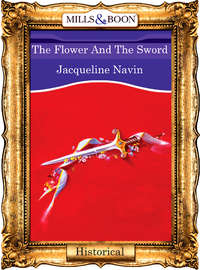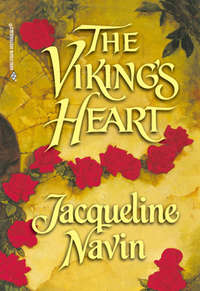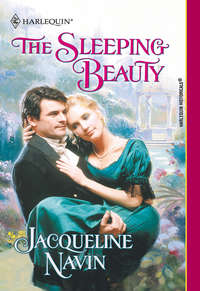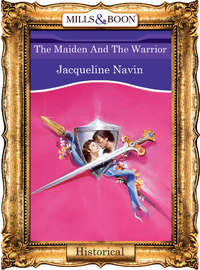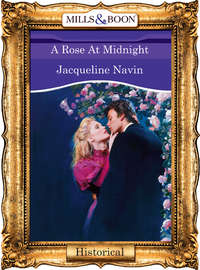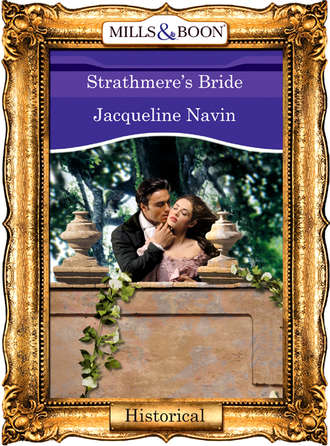
Полная версия
Strathmere's Bride
Despite her disconcerting remarks, Jareth countered without hesitation. “Yes, I do indeed. In its proper place, enjoyment is essential to a satisfactory existence. But there are other things that make for a complete life. Duty and responsibility, for example, and conducting yourself with dignity and self-respect. And all things in moderation, Miss Pesserat.”
She wrinkled her nose. “You English put much stock in all of that mod-a-ray-shon.”
Was she mocking him? “Are you saying you think it useless to know how to hold oneself with dignity?”
Her spine stiffened visibly. “The French have dignity.”
Now she had made it sound as if he were insulting her heritage. He sighed, shaking his head in exasperation. “If you wish to misunderstand me apurpose, I can do nothing to stop you, but I suggest you listen closely to my words to avoid unpleasantness. I believe I am being quite clear. We—my mother and I—would like you to alter the haphazard way in which you perform your duties. The children must be schooled in their manners and appropriate decorum befitting their station. You have an obligation to instruct them in these things, Miss Pesserat, as is your duty as governess.”
“I agree with you, I do.” Chloe paused, seeming troubled. “But not at this time, your grace. They are recovering from an unspeakable event—”
“More the reason to establish normal routines,” he interjected forcefully, “to help them recover and enjoy the security of a structured environment.”
“I disagree,” she countered. Jareth couldn’t help a grudging admiration at her courage, for as much as he did not appreciate it, he couldn’t fault her for it. She was fighting for what she believed in, fighting for the sake of the children.
But she was, of course, wrong.
“They need love and joy,” she insisted.
“In measure, Miss Pesserat, in measure.”
She stood in a breathtakingly fluid movement. “No, in abundance, sir.”
He stared at her, donning the careful languid laziness those of his class cultivated to handle such vulgar outbursts of emotion. After a long pause, she sat back down. He said in a clipped, precise voice, “If you have reined yourself under control, we can resume our conversation.”
“But there is nothing to discuss. You and I disagree. You are in charge, but I am the one with the children in my care. What precisely do you suggest we discuss?”
Surprisingly, she had summed the situation up quite succinctly. They were at an impasse.
However, before Jareth had ever dreamed he would inherit the dukedom from his brother, he had spent eleven years in the business world. He had started a shipping business with an adept young commoner, a man by the name of Colin Burke, who had won a sturdy vessel in a game of cards. Jareth’s infusion of capital created Burke and Hunt Shipping. They started with one ship. The fleet grew over the years. Colin captained his own vessel and dealt with the local merchants in each port of call, but Jareth had been the one to move among his peers, culling investors and striking deals among the aristocracy.
He was a duke by birth, but a deal maker by trade. Why hadn’t he thought of that before?
“We should discuss a compromise, Miss Pesserat,” he said at last. “Since we both have differing views, as you so aptly put it, but both sincerely want what is best for my nieces, then I suppose we must find some way to meld our ideas together.”
He could see she was suspicious. “A truce?”
“A compromise. Meeting halfway.”
“I know what compromise means.” She wasn’t ready to give in. “What do you suggest?”
“A parceling of time, as it were.” He sat down across from her and leaned forward, wanting to meet her eye-to-eye. When he had wanted to intimidate her, he took the advantage of having her seated and him standing, but now they were going to compromise and so should meet as equals. Or so it would appear.
“What I suggest, Miss Pesserat, is that the children’s time be structured to include a substantial amount of time for play. This would have to be conducted within the confines of the nursery, however. Of course, there should be occasional outings, but these should proceed in an orderly fashion with an eye toward their education. Perhaps a stroll to the pond to observe the ducks and other aspects of nature.” She was sitting perfectly still. He inclined his head forward and lowered his voice slightly, lending an illusion of conspiracy. “During these times they will conduct themselves as ladies should, you understand. The kind of romping the children presently engage in should be kept to contained places where they may not be inadvertently observed. The walled garden beyond the kitchens, for example, is a lovely place.”
She remained quiet. This encouraged him. “Also, I am told their manners at tea are atrocious. I should like to begin taking tea with them so as to help with their instruction in this regard.”
Chloe felt her eyes snap wide and a snorting sort of laugh escaped her before she could stop it. She brought her hand up quickly over her mouth. Visions of the duke seated at the tea table with the children, observing their antics—which were, she would agree, deplorable for gentle company but perfectly natural for children of their age—were decidedly funny.
The duke snapped his mouth shut and stared at her. She disliked that look. She had seen it before. It was how the dowager duchess always regarded her.
Coughing, she brought herself under control. “I am sorry, your grace. Please continue.”
He waited a good minute or more before he spoke again. “I wish to be more involved with my nieces, and I shall be. I will be overseeing their instruction and so I expect to see progress in the areas of self-discipline.” He leaned back in his chair and laced his fingers together over his chest.
Chloe had had enough pretense. Politely, she said, “But that is no compromise, your grace. It is what you have wanted all along.”
He didn’t move, didn’t even blink.
Then he smiled. It wasn’t a warm smile.
“Miss Pesserat,” he began with studious patience. “I am going to see that my nieces are brought up as proper ladies of their station should be, with or without your cooperation.”
Was he threatening her? “Monsieur, are you saying you will dismiss me if I do not agree?”
“If you think your position in this house, and in those children’s lives, is utterly inalterable, I will tell you, Miss Pesserat, that I will not hesitate to terminate your employment here regardless of the dire warning of the doctor—of which I can only assume you are aware, since you seem uncannily sure of yourself. This I will do if I determine the damage to the children would be greater if you were to stay than to go.”
A sick, heavy feeling pressed down on her chest, making her feel slightly ill. Chloe tried to determine whether or not he was bluffing.
Not that she cared a whit for the position. Or Strathmere or England for that matter. But the children..
That she could not have. It was a sacred trust her beloved cousin had given her. Bethany had brought her into her children’s lives to help strike a balance between the constraints of the girls’ societal position and the more simple pleasures life had to offer.
Friends since girlhood, Bethany had always said Chloe had a talent for living. Chloe hadn’t understood what she meant, for the manner in which she approached life was completely natural to her. However, she had recognized the blatant appeal in her cousin’s letter and accepted the position. When she arrived at Strathmere, she had seen immediately what Bethany had feared—that her precious daughters would miss out on all the joie de vivre and lead, if it were up to the dowager duchess, a dreary existence dominated by etiquette, restraint and, above all, moderation.
Chloe looked at Jareth with cool assessment. “You would pitch the children into another loss so soon after the death of their parents just so you might have your way? Is it so important, then, to win?”
He was visibly taken aback, stunned to hear it put that way. Recovering quickly, he countered, “I will take whatever steps necessary to protect and guide my nieces.”
“You spent too many years at the bargaining table, your grace. Your mother loved to tell everyone of your great success, so I know you were a very good businessman. But this is not a cargo we are speaking of, but little ones, precious to me.”
“And to me,” he added sharply.
She shook her head. “You do not even know them. You were not here when they lost their mama and papa. You do not hold Rebeccah in your arms at night while she cries out. You say you know what is best for them, but how can you know?”
He paled. “How can you?” he challenged, but his voice lost its edge.
She gave him a little smile. “I do not know, your grace. I only follow what is in my heart.”
He stayed silent, watching her with those dark, dark eyes. They were like pools of pitch. Something passed over them, an indefinable emotion Chloe didn’t understand. She didn’t have any hope of him comprehending what she was trying to accomplish with the children, and she certainly didn’t expect to win his approval. But she would not be dismissed.
Drawing in a long breath, he said, in a steady, deep voice, “I will not argue with you, Miss Pesserat. I have a duty to my nieces that I shall see done to the best of my ability. You—” he paused”—shall make your own choices.”
“Yes,” she said quietly, standing. “You speak of duty as if only a duke could truly know its meaning. I have a duty as well, your grace.”
With that, she strode to the door, bracing herself for some comment, some parting gibe he would throw out in order to have the last word. When it didn’t come, she placed her hand on the doorknob and glanced back over her shoulder. The duke was watching her, body stiff, face inscrutable.
It was then it struck her that she had been wrong. He wasn’t interested in “winning,” as she had accused him. She saw the troubled look on his face and it wasn’t anger. He truly cared about his nieces. He wanted what was best for them.
But he was, of course, wrong.
She turned back around and left, heading to her room.
It didn’t matter what his motives were. Chloe loved her cousin’s daughters with a fierce protectiveness, no less than if they had been her own. She would not allow the duke to destroy them, even if he did it with the best of intentions.
Chapter Three
In the drawing room, Helena Rathford arranged her skirts with a quick flick of her wrist, then gave a nod to her accompanist seated at the pianoforte. Her mother nodded back and struck the first chord.
Jareth watched the young woman, impressed with her grace, her self-possession, her lovely face. Hers was a commanding kind of beauty—strong, high cheekbones with slashing hollows underneath, thin lips of bright primrose, a fine nose and chin, all framed with silvery-blond hair. She closed her pale lashes over ice-blue eyes, drew in a breath and began to sing.
Her voice was magnificent. Jareth stood transfixed for a moment as Helena gave life to the notes. It appeared to be almost painful, as if she dragged the melody up from her soul to set it free into the air.
Something, the touch of her gaze perhaps, made him glance at his mother. She was looking back at him, a crafty, knowing smile just slightly twisting her lips. Her eyes slid away, but there was satisfaction in them, he saw.
Jareth was no idiot, which was what he would have to have been to be oblivious to his mother’s intentions with regard to Lady Helena Rathford. He glanced up, examining the woman his mother wanted him to marry. Beauty, breeding, accomplished in the arts, congenial and pleasant. His mother’s discriminating taste had ferreted out a superior specimen of womanly excellence.
The music washed over him, and he let it take him with it as it built. His gaze drifted to the window. To the night, and to the stars, spilled across the sky like a thousand brilliant diamonds on black velvet. They were his great love, the stars. So beautiful, so mysterious. Complex, yet predictable, stable. Each season bringing its own patterns to study, to wonder about, yet an ever changing panorama.
Strange, but he felt so emotional just now. Perhaps it was Helena’s impassioned song, perhaps it was being home after so long, perhaps grief. He didn’t know. He only knew a bleak sadness was welling up inside him, hardening his throat and pricking the back of his eyes.
That was when he saw the movement. Down in the garden, a shadow flitting among the symmetrical boxwoods. Dark gray against the paler color of the night sky, it was the figure of a woman.
She moved out into the open. She must have heard the music, for she lifted her hands and Jareth knew her identity, for only one person in all his life had he ever witnessed to have such beauty in her movements.
Miss Pesserat swayed, then folded her arms about herself. The moon was fat and low behind her. She twirled, then pointed a toe. He could almost imagine her laugh when her head fell back and all that loose hair caught in the moonlight.
The ache within him eased.
Catching himself, he turned his attention back to Helena. Poised, so very lovely, her face bespoke of the anguish of her song, the gorgeous Italian words sung with fluency and expertly accented. Behind her, Lady Rathford beamed. So proud, her face flushed, eyes almost glazed over as she gazed upon her offspring. Curious, Jareth shot a glance to Lord Rathford. He was seated on a Chippendale chair by the fire, his chin on his chest. He was sleeping.
Jareth almost smiled at the contrast between the man’s apathy and his wife’s euphoria. During dinner, he had been witness to the many differences in them, almost polar opposites on every matter. Yet between them, they had produced this remarkable creature.
Regarding Helena once again, Jareth studied her, assessing her for the role for which his mother had brought her before him. She would make an exemplary duchess, and an acceptable wife and companion.
Yes, he decided. He could do much worse than Helena Rathford.
Chloe settled into her bed. The cup of tea she had set on her bedside table had cooled, but that didn’t disturb her. She still found the drink soothing. She loved the English custom of drinking tea, and she loved their gardens, although she considered them much too severe in design. Everything exact and perfectly aligned. She wanted to plant a huge bush on the right, sprinkle some bulbs from Amsterdam off to the left, draw the eye to an asymmetrical configuration, but it wasn’t her house. It wasn’t her garden, although she always referred to it as such in her mind. She’d sometimes think, I shall go down to my garden tonight, and walk in the darkness and dream of home.
Except tonight her thoughts had been much closer to her present home than her past. She could not keep herself from thinking about the duke. For all of his impeccably tailored clothing and unwaveringly cool manner, she had thought she spied a sadness in his dark eyes, eyes that were almost pretty, with an absurd abundance of sooty lashes that would make any debutante weep with envy. But he had disappointed her in the end, hadn’t he, caught just as much in the trappings of high convention as his myopic mother.
She sighed and sipped the tepid tea. She had almost forgotten her father’s letter, with so much on her mind. With a smile, she sank down against the assemblage of pillows piled behind her. It was one of the few luxuries in which she indulged, this plethora of pillows.
She opened her letter. Papa’s bold, spidery handwriting scrawled out the French words. Reading them was like music to her.
Dearest daughter,
It is my fondest wish this letter finds you well and happy. Your last letter was amusing, so I am to think you are faring better in England than I would have guessed. How I miss you. Last night, Madame Duvier asked about you and we laughed, recalling how you sneaked the lamb into your bedchamber when you were five years old, and I realized then that I miss your mischief, though I can hardly believe I’m saying so.
Madame Duvier loved to tell that story. The pretty widow had a talent for making people laugh, and her father had been mentioning her often in his letters of late. Perhaps he was hinting at something, seeing if Chloe approved. She resolved to include abundant praise for the woman in her next letter. Papa was so funny to worry. Hadn’t she been prodding and pushing him for years since Mama had died to find someone to fill his life?
The rest of the letter included the usual gossip about her brother, who continued, against her father’s good counsel, to pay court to a village girl everyone knew was fickle and false. Her sister, Gigi, was well, her baby growing rapidly and, according to Papa, petted and spoiled and utterly enchanting.
When Chloe was through, she read it again, then folded it and tucked it in her nightstand drawer. She would read it several more times before placing it with the others in the cloth-covered box under her bed.
She stretched out, feeling the familiar warm mixture of pleasure and pain in her breast It was always like this after Papa’s letters. She missed them all, her family, who were flawed, yes, and not grand like dukes or duchesses, but pleasant, simple folk.
That was what she missed most of all. Being loved.
She dreamed that night of swimming. Somehow, she could breathe when submerged, and it was exhilarating. Exploring delightful worlds, she kicked upward, beckoned by muffled screams.
The screams were real. Rebeccah, she realized, her feet swinging out from under the covers. Without a second thought, she rushed into the nursery next door.
“Do we call him Uncle Strathmere?” Rebeccah asked, frowning.
“No, ma petite, you simply address him as you’ve always done.”
“He never smiles. I do not like him. I think he may be mean.”
Chloe angled her head, setting a mobcap onto the child’s dark curls.
They were dressing up in the old garments from a trunk pilfered from the attics, one of Rebeccah’s favorite activities. She was currently garbed in a flowing empire gown, a fashionably flimsy piece from the previous generation, when bodices were dampened and nipples rouged. Now the once decadent garment sagged, sadly innocent on the thin coltishness of the little girl’s body.
Turning to Sarah, Chloe dropped a huge bonnet made up in the fashion of the cavaliers, with one huge plume curling behind, on the tot’s head. Rebeccah cried, “I want that one!”
“You have a fine bonnet,” Chloe protested, adjusting the hat so that the three-year-old’s eyes were no longer covered. “Sarah shall be your suitor.”
“Oh, horrid!” Rebeccah cried in disgust. She ripped off the mobcap and flung herself down onto the floor with a flourish.
“Please yourself,” Chloe said with a shrug.
“All right!” Rebeccah replied when she saw Chloe meant to leave her alone to sulk. Snatching up the mobcap again, she jammed it on her head. “But I’m ugly.”
Chloe gave her a long, thoughtful stare. “Perhaps you are right, chérie. Let us find something that suits your fancy dress better, oui?”
When investigation of the trunks failed to reveal anything as dazzling as Sarah’s hat, Rebeccah went into another sulk. “Everything is horrid,” she complained. “First Uncle is mean, and now I have no beautiful hat.”
“Your uncle is not mean,” Chloe protested, although she could barely think of something positive to say about the man. He was rather dour. “Perhaps he has much on his mind. We must do our best to welcome him and help him. He has been away from Strathmere for a very long time.”
The child folded her small arms across her chest. “He must not interfere with the nursery. You must tell him, Miss Chloe. Except, of course, for new toys. We simply have to have some new toys.”
Chloe rolled her eyes.
The child continued. “I shall tell him everything is dreadfully old. Grandmama won’t let us have any fun. He must tell Grandmama to stay away from us and to let—”
Without a word, Chloe placed her hand on Rebeccah’s forehead and gave a gentle push. The little girl flopped backward, landing among the heap of dresses behind her, her legs flailing in the air.
Chloe turned to Sarah, who smiled. “What do you think of your uncle, Sarah?” The child merely gazed back. Chloe continued, unperturbed by Sarah’s silence. “Ah, I agree. Much too serious. It is rather sad, I think, to mope about in such a manner all the day.” As if to herself, she muttered, “Moderation. Humph.” With a quick sigh, she reached out a hand and pulled the struggling Rebeccah to her feet. “Enough, Queen Rebeccah. You can think up orders for the new duke another time. Let—”
Chloe stopped, stunned into silence, for she looked up just then to find a tall male figure standing inside the doorway of the nursery.
Instantly, she was aware of the confusion around her, of the children’s mussed appearance, of her own rumpled dress and hair all astraggle. She sat there, staring at him, the picture of decorum in stark contrast to her dishabille. He was, as was his custom, dressed in dark trousers that had been so crisply pressed the seam was as fine and straight as a saber’s edge. His expertly tied cravat lay in soft folds against a shirt as white and pristine as a new sheet of bleached parchment. Steady eyes glittered at her without a hint of reaction to anything he might have heard.
He glanced around the room. She saw his nostrils flare, a sign of annoyance, she was certain. The toys had not yet been put away, and the watercolors were still out, curdling in their ceramic trays with caked brushes scattered over the children’s masterpieces.
Chloe came to her feet. “Good morning, your grace.”
Rebeccah sidled to Chloe’s side, all show of bravery gone. Chloe’s hand came to rest on the child’s shoulder, hugging her against her hip protectively.
The duke looked simply…contemptuous. Clasping his hands behind his back, he walked a tight circle about the nursery, like a general inspecting barracks. He paused over the colors bleeding into one another on the children’s paintings, and moved on.
He sniffed. “The nursery is untidy, Miss Pesserat.”
“We are playing,” Chloe answered. “See? Dressing fancy.” She gave him a small, ironic smile. “A kind of history lesson, n’est-ce pas?”
“Unacceptable,” he shot back, and began to walk about again. “This room is a disgrace. The children must be taught to pick up after themselves. The servants are not to be used as an excuse for bad habits.”
Chloe almost groaned when he picked up a smashed wooden figure. Rebeccah had demolished the thing during one of her tantrums, then thrown it aside. Chloe, intent on gaining control of the child, had forgotten to discard the ruined toy.
Without thinking, she stepped forward and took the piece from him. His long, sun-browned fingers released it, brushing hers for an instant. She was surprised how warm they were, for this was a cold man.
She glanced at him to find a satirical smile twisting his handsome mouth. “I quite agree. We do our cleaning before lunch. Would you like to stay and supervise?”
Jareth gave her a withering stare. “I have other duties.” He spoke in a calculated tone meant to convey an order. “I have no doubts that the room will be put to rights, just as I instructed. I trust that from our last conversation we understand each other very well.”
The arrogance of his words brought instant reaction. “There was no understanding, your grace. At least I was not brought to any further understanding of you. You may have had some enlightenment from my explanations of my philosophies, but I…” She tapped her fingertip against her bottom lip. It was an insolent gesture and she knew it. “No, I cannot say I understand anything about you.”


